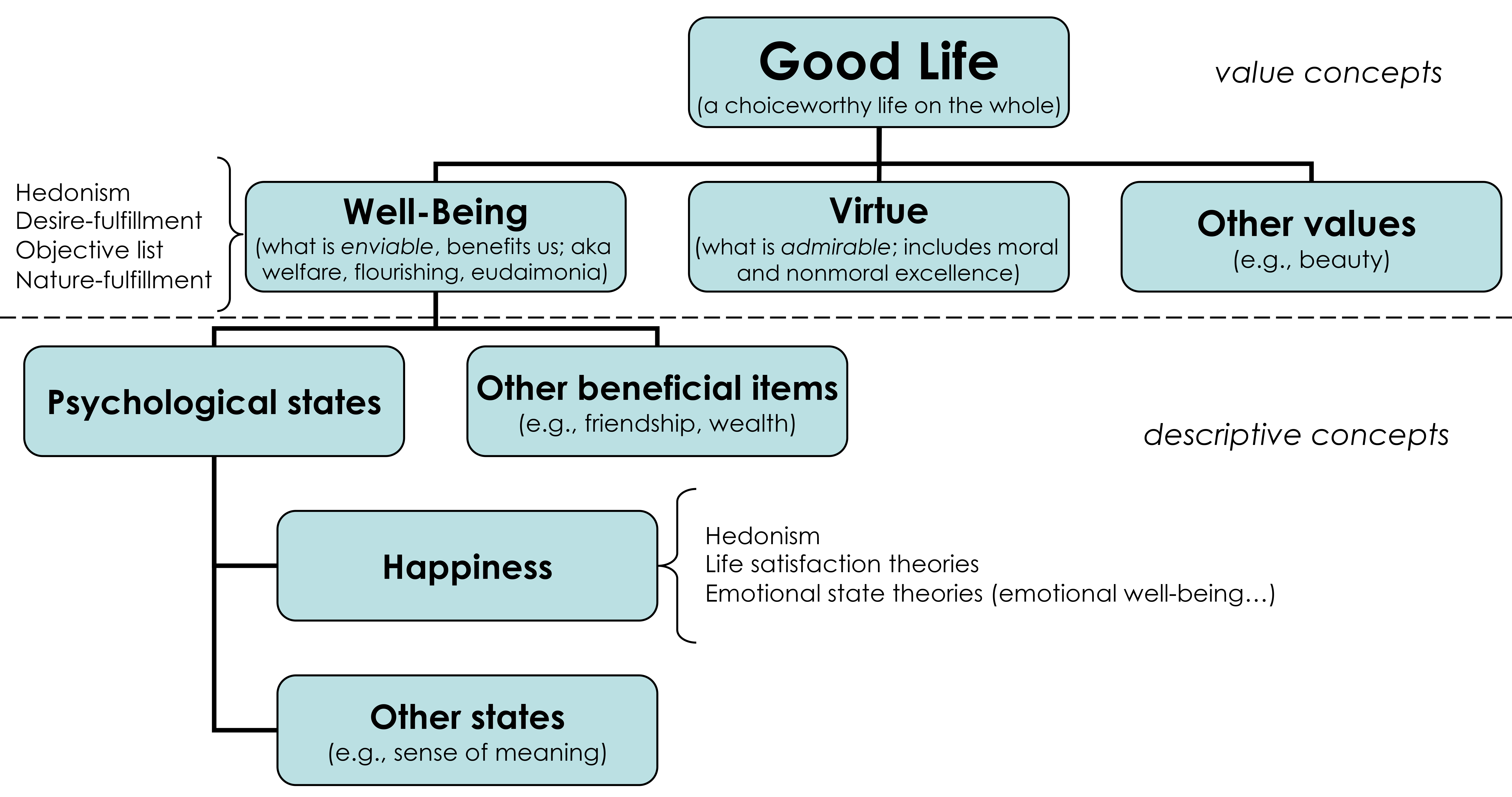Well-Being, Justice, and the Good Life
1 Well-Being
- Well-Being
- What is noninstrumentally good for a person
Theories of well-being attempt to tell us what makes a person’s life better or worse for them.
Synonyms and terms closely associated with well-being include:
- welfare
- personal-interest
- self-interest
- quality of life
- eudaimonia
- happiness
- flourishing
Key Concepts
- Instrumental Value
- Something is instrumentally valuable if and only if it is valuable as a means to some other valuable thing.
- It is good because of it’s consequences.
- Final Value (non-instrumental value)
- Something is finally valuable if and only if it is valuable as an end.
- It is good “for its own sake.”
- Prudential/Personal Value
- Something is prudentially valuable for someone if and only if it benefits that person.
Glaucon on Well-Being Plato’s Republic
Glaucon on three kinds of goods:
How would you arrange goods—are there not some which we welcome for their own sakes, and independently of their consequences, as, for example, harmless pleasures and enjoyments, which delight us at the time, although nothing follows from them? … Is there not also a second class of goods, such as knowledge, sight, health, which are desirable not only in themselves, but also for their results? … And would you not recognize a third class, such as [exercising, receiving medical treatment, and working]—these do us good but we regard them as disagreeable; and no one would choose them for their own sakes, but only for the sake of some reward or result which flows from them?
— Glaucon in Plato’s Republic 357b–d
Mere Final Value: Good for its own sake but not for its consequences
harmless pleasures and enjoymentsFinal and Instrumental: Good for its own sake and its consequences.
knowledge, sight, and healthMere Instrumental Value: Good for its consequences, but not for its own sake.1
exercising, receiving medical treatment, and workingGlaucon then ask Socrates to place justice in one of these three categories.
I want to know in which of the three classes you would place justice?
– Glaucon in Plato’s Republic 357d
2 Well-Being and Justice
Well-Being and Justice: The Popular View
This they affirm to be the origin and nature of justice;—it is a mean or compromise, between the best of all, which is to do injustice and not be punished, and the worst of all, which is to suffer injustice without the power of retaliation; and justice, being at a middle point between the two, is tolerated not as a good, but as the lesser evil, and honoured by reason of the inability of men to do injustice.
– Glaucon in Plato’s Republic 359a
The Ring of Gyges
If you could imagine any one obtaining this power of becoming invisible, and never doing any wrong or touching what was another’s, he would be thought by the lookers-on to be a 40 most wretched idiot, although they would praise him to one another’s faces, and keep up appearances with one another from a fear that they too might suffer injustice.
– Glaucon in Plato’s Republic 360d
The just life and the unjust life
After the story of Gyges, Glaucon describes two different lives:
- a perfectly (entirely) unjust life
- a perfectly (entirely) just life
What makes the unjust life good? Consequences
What what about just life?
3 The Good Life
What does it mean to say that someone has a “good life”? Read each prompt and complete the survey below.
Simon the plantation owner
It is the early 1800s, and Simon is a wealthy plantation owner in the Southern United States. He owns many slaves, who live in harsh conditions and are often treated cruelly. But this is typical of the region and Simon pays little attention to their fate.
Simon enjoys a rich social life, a close family, and a leisurely lifestyle with interesting hobbies to engage his time. He is very satisfied with his life, takes great pleasure in everyday activities, and is generally cheerful and relaxed. He is untroubled, and sleeps well at night.
To what extent do you agree or disagree with the following claims?
[1: completely disagree, 7: completely agree]
- “Simon is a morally good person.”
- “Simon is happy.”
- “Simon is doing well.”
- “Simon leads a good life.”
Prompt from Kneer and Haybron (2023)
Bernard the doctor
It Is the early 1800s, and Bernard is a wealthy doctor in the Southern United States. He practices general medicine, and has cured many people in town and from other cities in the region who came to visit him.
Bernard enjoys a rich social life, a close family, and a leisurely lifestyle with interesting hobbies to engage his time. He is very satisfied with his life, takes pleasure in many everyday activities, and is generally cheerful and relaxed. He is untroubled, and sleeps well at night.
To what extent do you agree or disagree with the following claims?
[1: completely disagree, 7: completely agree]
- “Bernard is a morally good person.”
- “Bernard is happy.”
- “Bernard is doing well.”
- “Bernard leads a good life.”
Prompt from Kneer and Haybron (2023)

4 Sources
References
Footnotes
Glaucon says that goods in this category are “disagreeable.” However, something can merely instrumentally valuable (only good for its consequences) without being disagreeable. For example, I might take a pain killer to relieve my headache. Taking a pain killer is only valuable because of it effect, but I don’t find taking the pain killer disagreeable.↩︎